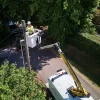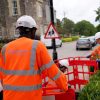57 Cross-party MPs Back Report Seeking Compensation for Slow Broadband
Grant Shapps’s (MP) cross-party British Infrastructure Group, which is supported by 57 MPs, has published its latest Broadbad 2.0 report, which among other things calls for consumers in the United Kingdom to be compensated for sub-10Mbps broadband speeds. Sadly it also makes some mistakes.
The original Broadbad 1.0 report, which was published in January 2016, grabbed headlines after it warned that “millions of citizens and businesses [were] experiencing slow or non-existent connections.” The blame for this was largely pinned on “systemic underinvestment stemming from the ‘natural monopoly’ of BT and Openreach,” which it accused of “stifling competition, hurting our constituents and in the process limiting Britain’s business and economic potential.”
The report, which relied upon a fair bit of old data, was far from perfect and failed to deliver a comprehensive assessment of the market or propose detailed solutions. Instead Shapps supported calls for the full separation of Openreach from BT, although the telecoms operator described his report and its recommendations as being “misleading and ill-judged” (here).
Advertisement
Nevertheless many people agreed with Shapp’s assessment and the report succeeded in showing that there was some political weight behind proposals for a more radical change. Since then Ofcom and BT have reached a voluntary agreement over Openreach’s “legal separation” (here, here and here), which includes new quality standards, as well as measures to open up more of their network to rivals and various changes to improve fairness
By contrast the new Broadbad 2.0 report appears to have switched tactics and instead focuses on broadband performance. In keeping with that it claims to have “found that as many as 6.7 million UK broadband connections may not receive speeds above [10Mbps]” and it makes some recommendations to help address this.
Broadband 2.0’s Recommendations
UK Government:
* Progress secondary legislation setting out the terms of a broadband Universal Service Obligation (USO):
Since broadband is increasingly considered to be as essential as utilities such as water or gas, minimum standards must be introduced to improve accessibility and connectivity across the country. The Digital Economy Act 2017 sets out provisions for a USO that defines a minimum broadband download speed of 10 Mb/s. In order to set the terms and scope of this USO, secondary legislation to the Digital Economy Act must be progressed by the government.
* Provide statutory footing to the Voluntary Codes of Practice for broadband speeds:
Some of the largest UK broadband providers operate according to Voluntary Codes of Practice regulated by Ofcom. The codes of practice entail an agreement on the part of providers to share clear information about their broadband speeds, and provide redress for customers when speeds are poor. However, the voluntary nature of these codes is insufficient in a rapidly developing telecoms sector. BIG therefore calls on the government to provide Ofcom with the mandate to legalise these codes of practice, in order to make broadband providers accountable to the law.
Ofcom:
* Lead on the improvement of data collection:
Broadband download speed data recorded by Ofcom fails to differentiate between superfast connections that do not reach speeds above the proposed minimum standard of 10 Mb/s, and those connections whereby customers have actively chosen not to purchase superfast broadband. It is therefore almost impossible to determine the exact number of UK broadband customers that do not receive the speeds that they pay for. BIG calls on Ofcom to lead on the improvement of collecting broadband speed data that distinguishes between the take-up and availability of superfast broadband speeds. This is essential for developing a clear picture of how many broadband customers fail to receive the service they pay for.
* Consider fixed broadband speeds in a new automatic compensation scheme:
It is unacceptable that Ofcom has not considered whether broadband customers should be automatically compensated for consistently failing to receive the speeds that they pay for. Broadband speeds are a key indicator for whether customers are receiving a satisfactory service.
Broadband Providers:
* Take responsibility for making customers aware of their complaints and compensation procedures:
An automatic compensation scheme will only be as effective as the number of customers that know about it. Therefore, BIG calls on broadband providers to take responsibility for communicating future changes to their customer services in a clear and concise manner, in order to improve accountability and transparency in the sector.
Most of the recommendations reflect ideas that are already being debated (e.g. a mandatory code of practice for broadband speeds and better data collection from ISPs), while few could disagree with the generalised notion of asking ISPs to make customers more aware of their complaints procedures.
However there are a few problems with the report, not least of which is the fact that it makes the mistake of confusing data gathered from consumer speedtests with that of actual network availability (i.e. the claim that up to 6.7 million users may fail to receive speeds of 10Mbps). This is crucial because it results in a misrepresentation by overlooking the existing availability of faster services.
Advertisement
Today it’s estimated that around 93% of premises are within reach of a fixed line superfast broadband (NGA) service and we’re ahead of most EU countries (example). However there’s still plenty of work left to do in order to reach the next target of 97% by 2020 and the final 3% are expected to be catered for via a legally-binding 10Mbps+ Universal Service Obligation. The USO may very well end up being funded by BT and KCOM (here).
In reality around a million properties (not 6.7 million) would currently be unable to receive a 10Mbps+ speed and that figure will fall over the next few years as coverage improves. Put another way, the report’s 6.7m figure is bogged down by the fact that around half of home broadband lines are still connected via slower ADSL, even though faster networks are often available (i.e. a lot of people haven’t upgraded due to various reasons such as a lack of awareness, higher prices, fear of switching, satisfaction with their existing connection etc.).
Strangely the report also criticises the data collected by industry regulator Ofcom, which it says “needs to clearly distinguish between the take-up and actual availability of superfast broadband.” However the regulator has been doing precisely this for quite awhile, such as via last year’s Connection Nations 2016 report and various related studies.
Andrew Glover, Chair of ISPA Council, said:
“ISPA members are actively rolling out super and ultrafast connections throughout the UK, increasing the availability of broadband of at least 10Mbps to over 95% of UK premises as speeds have increased to an average 51Mbps. As well as competing on the quality of broadband, ISPs compete on customer service, and new and existing consumer protection measures provide a strong basis for maintaining good service levels.
ISPA welcomes parliamentary interest in broadband and we have helped support MP’s local broadband campaigns, but it is important that research and reports that inform policy are robust. By failing to acknowledge the work that is already underway and selective use of data, this latest report falls short of this standard.”
Ofcom has already proposed a system of automatic compensation for a protracted losses of broadband connectivity and missed engineer appointments (here), which is expected to cost ISPs up to £185m per year. The above report’s idea of expanding on this to compensate for slow broadband will no doubt also appeal to a lot of people, but it could cost a lot more and be very difficult to implement.
Advertisement
The Causes of Slow Speed
The causes of slow speed are significantly more complicated to pin down than connection loss. Certainly some issues can stem from controllable aspects, such as regional network capacity or traffic management, but on the other hand ISPs cannot magically overcome any of the inherent physical limitations with existing infrastructure (particularly on ADSL / FTTC services provided via Openreach’s (BT) network); these cause most of the issues.
On top of that poor speeds can also be caused by problems that exist inside your home, such as poor wiring, weak / congested WiFi signals, home network congestion (i.e. lots of people / apps using your connection at the same time), hardware faults, restrictions on performance imposed by remote internet content services (websites and servers etc.) and so forth.
Lest we forget that affordable consumer broadband connections are often only possible because capacity is shared between many users, which is partly why the performance at peak (busy) times often suffers a fall (experiences vary). Even the best Gigabit capable “full fibre” (FTTP/H) ISPs may not always be able to deliver their top speeds because of factors like some of those mentioned above.
Suffice to say that it would be tricky to correctly judge when to apply compensation and such a system is likely to be hugely expensive. Extra costs like that will of course end up being passed on to end-users. It’s almost as if the goal of Broadband 2.0 is to give everybody a dedicated and uncontended connection, which is all well and good but that is a business connection and they can cost several times more than a residential service. Likewise ADSL and FTTC / VDSL2 users would still be hindered by the physical limitations of their line.
Mass market affordability requires commercial compromise, unless the Government is willing to build a national full fibre network at huge cost and then give it to every one of us on the cheap (as some other countries have done). However that opens up a whole new can of worms (anti-competitive practices, public spending etc.) and is unlikely to happen in the UK’s diverse market. As above, it also wouldn’t fix all the issues with speed.
So while we welcome the pro-consumer positions of Broadbad 2.0 and agree that some aspects need improvement, we are sadly frustrated by the fact that the report appears to adopt the headless chicken approach to policy making by proposing changes without fully understanding the challenges involved or offering any detail on how to implement and measure them.
SIDE NOTE 1: We’ve had one copy of the press release saying the report is supported by 57 MPs and another saying 56 MPs, so don’t be surprised if you see a few variations in the headlines today.
SIDE NOTE 2: If the rumours are true then right now the battle has already shifted and there’s a very real risk that the Government may downgrade its legally-binding USO proposal to a non-binding USC (Commitment). We should know soon enough.
Mark is a professional technology writer, IT consultant and computer engineer from Dorset (England), he also founded ISPreview in 1999 and enjoys analysing the latest telecoms and broadband developments. Find me on X (Twitter), Mastodon, Facebook, BlueSky, Threads.net and Linkedin.
« Ofcom Consults on UK Use of 26GHz and 3.6-3.8GHz for Future 5G Mobile

















































Comments are closed